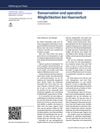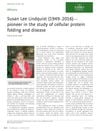 September 2021 in “Journal of skin and stem cell”
September 2021 in “Journal of skin and stem cell” Lactium, a milk protein, can help reduce symptoms of skin disorders linked to stress and anxiety without side effects.
 July 2023 in “bioRxiv (Cold Spring Harbor Laboratory)”
July 2023 in “bioRxiv (Cold Spring Harbor Laboratory)” The Arabidopsis rhd2 mutant is more sensitive to drought because of changes in cell membrane proteins and cell structure.
 6 citations,
May 2022 in “Frontiers in physiology”
6 citations,
May 2022 in “Frontiers in physiology” Injecting CHIR-99021 into goose embryos improves feather growth by changing gene activity and energy processes.
 July 2021 in “Journal Für Ästhetische Chirurgie”
July 2021 in “Journal Für Ästhetische Chirurgie” Effective hair loss treatments require medical diagnosis and realistic expectations, with hair transplants offering improved, natural-looking results.
 1 citations,
October 2000 in “Pediatrics in Review”
1 citations,
October 2000 in “Pediatrics in Review” The document says that hookworms are treated with mebendazole and stress-related hair loss usually gets better in 6 months, while other hair loss types have specific treatments.
 July 1998 in “Chromatographia”
July 1998 in “Chromatographia” Women with effluvium have higher levels of certain urinary steroids, possibly due to stress and increased adrenal activity.
 September 2016 in “Elsevier eBooks”
September 2016 in “Elsevier eBooks” Different types of hair loss in dogs and cats have various causes and treatments, with outcomes ranging from good to uncertain.
 8 citations,
January 2013 in “BioMed Research International”
8 citations,
January 2013 in “BioMed Research International” Age, gender, and hair loss affect scalp characteristics differently in young Caucasian adults.
 November 2020 in “Holistic Nursing Practice”
November 2020 in “Holistic Nursing Practice” COVID-19 can cause hair loss, loss of taste and smell, skin changes, and eye problems.
 January 2013 in “Yearbook of Urology”
January 2013 in “Yearbook of Urology” The Princeton III Consensus recommends assessing cardiovascular risk in men with erectile dysfunction and prioritizing heart health before treating ED, especially in those with potential heart disease.
 62 citations,
March 2011 in “European journal of endocrinology”
62 citations,
March 2011 in “European journal of endocrinology” Some parents have a mild form of congenital adrenal hyperplasia without symptoms, and they usually don't need treatment.
New treatments for alopecia areata, like JAK inhibitors and immunomodulators, are promising.
 97 citations,
March 2009 in “Dermato-endocrinology”
97 citations,
March 2009 in “Dermato-endocrinology” Hormones significantly affect hair and oil gland function in the skin, and more research is needed on skin-related hormone disorders.
Hair can naturally regain color after greying, and this change may be linked to stress levels.
19 citations,
September 2020 in “General and comparative endocrinology” Hair cortisol is a reliable stress indicator in cattle but may not be valid for pigs.
 170 citations,
December 2009 in “Histopathology”
170 citations,
December 2009 in “Histopathology” The conclusion is that accurate diagnosis of different types of hair loss requires good teamwork between skin doctors and lab experts.
 January 2019 in “Indian Dermatology Online Journal”
January 2019 in “Indian Dermatology Online Journal” Stress, hypothyroidism, drug intake, and anemia are important factors in women's diffuse hair loss.
 April 2021 in “European journal of medical and health sciences”
April 2021 in “European journal of medical and health sciences” The pandemic stress may have increased alopecia cases in Bangladesh.
 77 citations,
March 2021 in “Nature”
77 citations,
March 2021 in “Nature” Stress hormone corticosterone blocks a growth factor to slow down hair stem cell activity and hair growth.
 2 citations,
January 2021 in “Przegląd Dermatologiczny (1959)”
2 citations,
January 2021 in “Przegląd Dermatologiczny (1959)” The article discusses various treatments for different types of non-scarring hair loss.
 1 citations,
January 2009 in “Journal of Clinical Dermatology”
1 citations,
January 2009 in “Journal of Clinical Dermatology” More men have Androgenic Alopecia than women, it's often inherited, and stress can contribute to it.
 3 citations,
January 2017 in “Yonsei Medical Journal”
3 citations,
January 2017 in “Yonsei Medical Journal” Blocking 11β-HSD1 can lessen the harmful effects of glucocorticoids on hair growth cells.
 2 citations,
December 2016 in “EMBO journal”
2 citations,
December 2016 in “EMBO journal” Susan Lee Lindquist was a pioneering biologist who made significant contributions to understanding protein folding and its role in disease.
 4 citations,
January 2007 in “Australian Veterinary Journal”
4 citations,
January 2007 in “Australian Veterinary Journal” A horse's sudden hair loss was caused by an allergic reaction to a coat conditioning powder.
29 citations,
February 2011 in “PloS one” Astressin-B can reverse and prevent hair loss in stressed mice.
 5 citations,
May 2021 in “Veterinary medicine and science”
5 citations,
May 2021 in “Veterinary medicine and science” Injecting cosyntropin into grizzly bears increases blood cortisol but doesn't change hair cortisol levels.
3 citations,
July 2023 in “International journal of molecular sciences” Stress may contribute to hair loss in alopecia areata by affecting immune responses and cell death in hair follicles.
 4 citations,
March 2013 in “Neuropsychiatric Disease and Treatment”
4 citations,
March 2013 in “Neuropsychiatric Disease and Treatment” A woman with anorexia and Cushing's syndrome improved after tumor removal, highlighting the need to consider hormonal issues in psychiatric conditions.
 7 citations,
January 2015 in “Journal of the European Academy of Dermatology and Venereology”
7 citations,
January 2015 in “Journal of the European Academy of Dermatology and Venereology” Only about 20% of women have hair loss after childbirth severe enough to be considered clinically significant.
 16 citations,
May 1998 in “International Journal of Dermatology”
16 citations,
May 1998 in “International Journal of Dermatology” Stress hormones like cortisol may trigger psoriasis flare-ups.

























